|
|
 |
Fiche d'espèce de Copépode |
|
|
Calanoida ( Ordre ) |
|
|
|
Diaptomoidea ( Superfamille ) |
|
|
|
Pontellidae ( Famille ) |
|
|
|
Pontella ( Genre ) |
|
|
| |
Pontella fera Dana, 1849 (F,M) | |
| | | | | | | Syn.: | Pontella fera (F) Dana,1849 (no M);
Pontellina (Eupontellina) fera : Claus, 1893 (p.273); | | | | Ref.: | | | Giesbrecht, 1892 (p.462, 478, 774, figs.F,M); Giesbrecht & Schmeil, 1898 (p.144, Rem. F,M); Thompson & Scott, 1903 (p.236, 252); A. Scott, 1909 (p.159, Rem.); Wolfenden, 1911 (p.361); Sewell, 1914 a (p.237); 1932 (p.377, Rem.); Farran, 1936 a (p.118); Sewell, 1947 (p.250); C.B. Wilson, 1950 (p.293, Rem.M, fig.M); Tanaka, 1964 c (p.263, figs.F,M); Chen & Zhang, 1965 (p.104, figs.F,M); Saraswathy, 1966 (1967) (p.83); Kos, 1972 (Vol. I, figs.F, M, Rem.); Silas & Pillai, 1973 (1976) (p.776, 816, figs.F,M, Rem.); Pillai, 1975 (p.130, figs.F,M); Marques, 1976 (p.995); 1982 (p.765, fig.F); Zheng & al., 1982 (p.78, figs.F,M); Ohtsuka & Onbé, 1991 (p.214); Kim & al., 1993 (p.270); Chihara & Murano, 1997 (p.869, Pl.153,156: F,M); Bradford-Grieve & al., 1999 (p.885, 960, figs.F,M); Mulyadi, 2000 (p.186, figs.F,M, Rem.); Mulyadi, 2002 (p.94, figs.F,M, Rem.); Conway & al., 2003 (p.134, figs.F,M, Rem.); Phukham, 2008 (p.88, figs.F); Jeong & al., 2008 (p.215, figs.F, Rem., variation: type I and type II). |  issued from : O. Tanaka in Publs Seto Mar. Biol. Lab., 1964, XII (3). [p.264, Fig.237]. Female: habitus (dorsal); b, last thoracic segment and urosome (right lateral side); c, P5. Nota: The last thoracic segment symmetrical, produced on each side into a small point. The rostrum slender with a slight trace of lens; the dorsal lens moderately large; the ventral lens rounded (infdigo colour). Male: P5. Nota: The urosome segments and furca are in the proportional lengths as 21: 18:18:7:4:33 = 100.
|
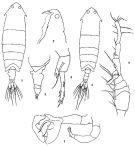 issued from: Q.-c Chen & S.-z. Zhang in Studia Marina Sinica, 1965, 7. [Pl.45, 1-7]. Female (from E China Sea): 1, habitus (dorsal); 2, forehead (lateral); 3, urosome (lateral left side); 4, P5 (posterior). Male: 5, habitus (dorsal); 6, right A1; 7, P5 (anterior).
|
 Issued from : Mulyadi in Crustaceana, 2003, 76 (4). [p.392, Table I)• Characteristic feature of five Pontella species groups in the Indo-West Pacific.
|
 issued from : E.G. Silas & P.P. Pillai in J. mar. biol. Ass. India, 1973 (1976), 15 (2). [p.817, Fig.19, a-f]. Female (from Indian Ocean): a, urosome (dorsal); b, idem (lateral left side); c, rostrum; d, P5. Nota: Posterior corners of 5th metasomal somite asymmetrically produced on either side into wing-like processes extending beyond middle of genital segment. Urosome 2-segmented, genital segment asymmetrical, being poduced laterally on left side; ventrally segment with two knob-like processes, which vary in size and shape according to age of animal. Caudal rami asymmetrical, left ramus being larger. Male: e, P5; f, right A1. Scale as in Calanopia minor.
|
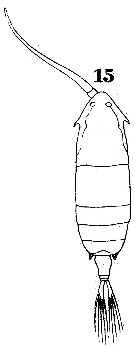 Issued from : W. Giesbrecht in Systematik und Faunistik der Pelagischen Copepoden des Golfes von Neapel und der angrenzenden Meeres-Abschnitte. – Fauna Flora Golf. Neapel, 1892. Atlas von 54 Tafeln. [Taf.40, Fig.15]. Female: 15, habitus (dorsal).
|
 Issued from : W. Giesbrecht in Systematik und Faunistik der Pelagischen Copepoden des Golfes von Neapel und der angrenzenden Meeres-Abschnitte. – Fauna Flora Golf. Neapel, 1892. Atlas von 54 Tafeln. [Taf.40, Fig.36]. Female: 36, forehead (lateral).
|
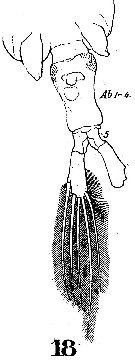 Issued from : W. Giesbrecht in Systematik und Faunistik der Pelagischen Copepoden des Golfes von Neapel und der angrenzenden Meeres-Abschnitte. – Fauna Flora Golf. Neapel, 1892. Atlas von 54 Tafeln. [Taf.40, Fig.18]. Female: 18, Th5 and urosome (ventral).
|
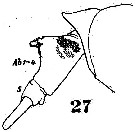 Issued from : W. Giesbrecht in Systematik und Faunistik der Pelagischen Copepoden des Golfes von Neapel und der angrenzenden Meeres-Abschnitte. – Fauna Flora Golf. Neapel, 1892. Atlas von 54 Tafeln. [Taf.40, Fig.27]. Female: 27, Th5 and urosome (lateral).
|
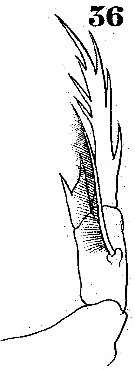 Issued from : W. Giesbrecht in Systematik und Faunistik der Pelagischen Copepoden des Golfes von Neapel und der angrenzenden Meeres-Abschnitte. – Fauna Flora Golf. Neapel, 1892. Atlas von 54 Tafeln. [Taf.24, Fig.36]. Female: 36, P5 (posterior view).
|
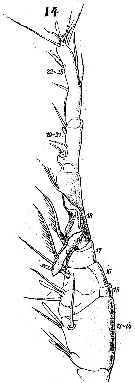 Issued from : W. Giesbrecht in Systematik und Faunistik der Pelagischen Copepoden des Golfes von Neapel und der angrenzenden Meeres-Abschnitte. – Fauna Flora Golf. Neapel, 1892. Atlas von 54 Tafeln. [Taf.24, Fig.14]. Male: 14, right A1 (distal part, dorsal view).
|
 Issued from : W. Giesbrecht in Systematik und Faunistik der Pelagischen Copepoden des Golfes von Neapel und der angrenzenden Meeres-Abschnitte. – Fauna Flora Golf. Neapel, 1892. Atlas von 54 Tafeln. [Taf.24, Figs.31, 34]. Male: 31, right P5 (anterior view); 34, left P5 (anterior view).
|
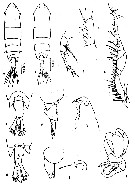 issued from : Z. Zheng, S. Li, S.J. Li & B. Chen in Marine planktonic copepods in Chinese waters. Shanghai Sc. Techn. Press, 1982 [p.79, Fig.45-1]. Female: a, habitus (dorsal); b, forehead (lateral); c-e, last portion prosome and urosome (dorsal, ventral and lateral, respectively); f, P5. Male: g, habitus (dorsal); h, A1; i, P5; j, right P5 (distal part). Scale bars in mm.
|
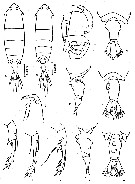 issued from : Z. Zheng, S. Li, S.J. Li & B. Chen in Marine planktonic copepods in Chinese waters. Shanghai Sc. Techn. Press, 1982 [p.80, Fig.45-2]. Female (different specimens): k, habitus (dorsal); l, forehead (lateral); m, last portion prosome and urosome (dorsal); n, p, idem (dorsal and lateral ledft side, respectively); o, q, idem (ventral); p-q, idem (ventral and lateral, left side, respectively); r-t, P5. Male: u, habitus (dorsal); v, P5. Scale bars in mm.
|
 issued from : H.G. Jeong, H.-L. Suh, Y.H. Yoon & H.Y. Soh in Ocean Sc. J., 2008, 43 (4). [p.217, Table 1]. Comparison of distinctive characters in the two types of Pontella fera. Nota: In the South Sea of Korea, female belongs to type 1 and is very similar to Giesbrecht's original (1892); however it differs from the latter by fusion of basis and endopod in P5 (separted in Giesbrecht's illustration). Among previous studies, type I is identical with illustrations of P. fera provided by Silas & Pillai (1973) and Zheng & al (1982) and type II is similar to figures of Chen & Zhang (1965) and Mulyadi (2000).
|
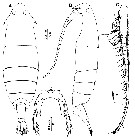 issued from : H.G. Jeong, H.-L. Suh, Y.H. Yoon & H.Y. Soh in Ocean Sc. J., 2008, 43 (4). [p.215, Fig.8]. Female (from SE Korea): A-B, habitus (dorsal and lateral, respectively); C, A1; D, P5.
|
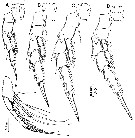 issued from : H.G. Jeong, H.-L. Suh, Y.H. Yoon & H.Y. Soh in Ocean Sc. J., 2008, 43 (4). [p.215, Fig.8]. Female: A-D, P1 to P4; E, Mxp.
|
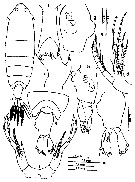 Issued from : Mulyadi in Treubia, 2002, 32. [p.95, Fig.31]. Female (from Jakarta Bay): a, habitus (dorsal); b, rostrum (anterior view); c, Md (masticatory edge); d, Mxp; e, 5th metasomal somite and urosome (dorsal); f, urosome (dorsal); g, genital complex (ventral); h, urosome (lateral); i, P5. Nota: Rostral lens feebly developed. A1 23-segmented, reaching 3rd metasomal somite. Urosomite 1 asymmetrical, produced laterally in a pair of knob-like processes on left side, ventral surface of somite with a pair of processes on proximal part of genital opening.
|
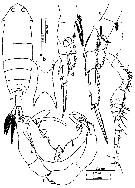 Issued from : Mulyadi in Treubia, 2002, 32. [p.97, Fig.32]. Male (from Jakarta Bay): a, habitus (dorsal); b, rostrum (anterior view); c, right A1; d, P1; e, P4; f, P5. Nota: 5th metasomal somite ending in bluntly rounded posterior processs of more or less equal in size. Urosome 5-segmented. Urosomite 1 asymmetrical, right side slightly longer than left. Caudal ramus asymmetrical, right ramus slightly longer. Right A1 geniculate, with curiously shape process with serrated upper margin on segment 17 and 18, fused segments 19-20 with button-shape process and 2 knob-like projections on anterior surface. The present specimen differs from the original description of P. fera or P. tenuiremis by the form of the genital processes in the female, and the form of P5, but are identical with illustrations of P. fera provided by Tanaka (1964) and Chang & Zhang (1965), but not with Silas & Pilai (1973).
|
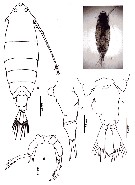 issued from : N. Phukham in Species diversity of calanoid copepods in Thai waters, Andaman Sea (Master of Science, Univ. Bangkok). 2008. [p.170, Fig.44]. Female (from W Malay Peninsula): a, habitus (dorsal); b-c, urosome (dorsal and left lateral side); d, P5. Body length after the drawing: F = 2.95 mm.
|
 issued from : P.P. Pillai in J. mar. biol. Ass. India, 1975, 17 (2). [p.132, Fig.1, a-c]. Female (from Indian Ocean): a, urosome (dorsal); b, P5. Male: c, P5 Scale: Single bar : 0.3 mm; doube bar = 0.25 mm.
|
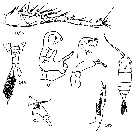 Issued from : J.M. Bradford-Grieve, E.L. Markhaseva, C.E.F. Rocha & B. Abiahy in South Atlantic Zooplankton, edit. D. Boltovskoy. 1999, Vol. 2, Copepoda; [p.1070, Fig. 7.392: Pontella fera. Ur = urosome; Ce = cephalosome; B = basis; r = right; r = right leg; l = left leg. Female characters (from key, p.959): - Genital segment with widest part anterior in dorsal view; P5 exopod with 2 long inner edge spines. - Caudal rami subequal. - Urosome of 2 somites. Male characters (from key, p.960): - Chelate right P5 exopodal segment1-2 with, besides 'thumb', 1 large projection in form of elongate, narrow lobe, rounded distally; exopodal segment 3 expanded distally.
|
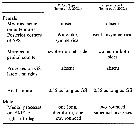 Issued from : O.E. Garrote, E. Suarez-Morales & A. Morales-Ramirez in Proc. Biol. Soc. Washington, 2015, 128 (2). [p.148, Table 1]. Nota: Compare of the P. fera with other members of the Pontella fera species group: P. tenuiremis, P. chierchiae and P. cocoensis. GS = genital double-somite; 5PS = fifth pedigerous somite; EXP = exopod.
| | | | | Ref. compl.: | | | Sewell, 1948 (p.322, 408); Heinrich, 1960 a (p.43: fig.1, 46: fig.2); Voronina, 1962 a (p.68, fig.3, 6); Ganapati & Shanthakumari, 1962 (p.9, 16); Herring, 1965 (p.103); Heinrich, 1969 (p.1461, fig.6); Itoh, 1970 (tab.1); Carter, 1977 (1978) (p.36); Gaudy & Boucker, 1983 (p.37, Table 1, 2, 5, Rem.: metabolism); Guangshan & Honglin, 1984 (p.118, tab.); Madhupratap & Haridas, 1986 (p.105, 112: Rem., tab.1); Heinrich, 1988 (p.89, fig.2); Yoo, 1991 (tab.1); Shih & Young, 1995 (p.72); Suarez-Morales & Gasca, 1998 a (p.110); Lopez-Ibarra & Palomares-Garcia, 2006 (p.63, Tabl. 1, seasonal abundance vs El-Niño, Rem.: p.67, 73); Hwang & al., 2006 (p.943, tabl. I); Dur & al., 2007 (p.197, Table IV); Tseng L.-C. & al., 2011 (p.47, Table 2, occurrences vs mesh sizes); Mulyadi & Rumengan, 2012 (p.202, Rem.: p.204); Tseng & al., 2013 (p.507, seasonal abundance); Hwang & al., 2014 (p.43, Appendix A: seasonal abundance); Palomares-Garcia & al., 2018 (p.178, Table 1: occurrence) | | | | NZ: | 10 | | |
|
Carte de distribution de Pontella fera par zones géographiques
|
| | | | | | | | | 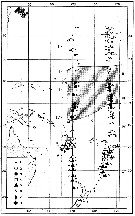 Issued from : A.K. Heinrich in Trudy Inst. Okeanol., 1960, 41. [p.43, Fig.1]. Issued from : A.K. Heinrich in Trudy Inst. Okeanol., 1960, 41. [p.43, Fig.1].
Distribution in the equatorial and tropical West Pacific of seven species of Pontellidae (Cruise of the R/V 'Vityaz', November 1957 to December 1958.
1: Stations; 2: Pontellopsis villosa; 3: Pontella fera; 4: Labidocera acutifrons; 5: Pontella whiteleggi; 6: Pontella tenuiremis; 7: Pontella chierchiae; 8: Labidocera acuta. |
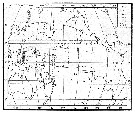 issued from : A.K. Heinrich in Zool. Zh., 1969, 48 (10) [p.1461, Fig.6]. issued from : A.K. Heinrich in Zool. Zh., 1969, 48 (10) [p.1461, Fig.6].
Distribution of four species of Pontellidae in the Pacific Ocean.
1: Pontella fera; 2: Pontella danae; 3:Pontella agassizi; 4: Pontella valida; 5: stations |
 issued from : H.G. Jeong, H.-L. Suh, Y.H. Yoon & H.Y. Soh in Ocean Sc. J., 2008, 43 (4). [p.220, Fig.12, B]. issued from : H.G. Jeong, H.-L. Suh, Y.H. Yoon & H.Y. Soh in Ocean Sc. J., 2008, 43 (4). [p.220, Fig.12, B].
Distribution of Pontella fera based on previous records and on the present study. |
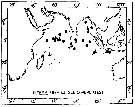 issued from : P. Pillai in J. mar. biol. Ass. India, 1975, 17 (2). [p.140, Fig.4]. issued from : P. Pillai in J. mar. biol. Ass. India, 1975, 17 (2). [p.140, Fig.4].
Occurrence of Pontella fera collected from 54 stations in the Indian Ocean (See in: Hand Book to the International Zooplankton Collections, volume I, 1969). |
| | | | Loc: | | | South Africa (Durban, Natal), off NE Tristan da Cunha, Red Sea, Arabian Sea, Indian Ocean (Mascarene Basin, Rodrigues Is. - Seychelles, Laccadive Is., Sri-Lanka, Lawson's Bay), Nicobar Is., G of Mannar, Nankauri Harbour, Bay of Bengal, Andaman Sea); W Malay Peninsula, Indonesia (jakarta Bay), Philippines, China Seas (Yellow Sea, East China Sea, South China Sea), Taiwan (SW, Danshuei Estuary, NE), S Korea, Japan, Hawaii, off NE Hawaii, Baja California (Bahia Magdalena: rare, La Paz), E Pacif (off Mexico); Pacif. (W equatorial), Samoa Is., Australia (Great Barrier Reef)
Type locality: 11°-12°45'N, 170°171°E. | | | | N: | 52 | | | | Lg.: | | | (34) F: 2,76; (44) F: 2,631-2,605; M: 2,605-2,511; (46) F: 2,7; M: 2,6-2,5; (120) F: 3,33-3; M: 3-2,81; (256) F: 2,92-2,36; M: 2,67-2,33; (290) F: 3,1-2,95; M: 2,85-2,75; (332) F: 2,7-2,37; M: 2,62; (333) F: 2,7; (530) F: 2; (900) F: 2,8-2,85; M: 2,5-2,6; (991) F: 2,36-2,92; M: 2,33-2,67; (1019) F: 2,63; (1023) F: 2,78-3,16; M: 2,61-3,09; (1115) F: 2,67-3,10; M: 2,4-2,66; {F: 2,00-3,33; M: 2,33-3,10} | | | | Rem.: | épipélagique. Neritique
Une doute subsiste concernant l'attribution à cette espèce de certaines figures in Silas & Pillai (1973, p.817), en particulier la figure 19 a, b et peut-être c, qui semblent assez différentes de celles d'autres auteurs.
Voir aussi les remarques en anglais | | | Dernière mise à jour : 08/12/2020 | |
|
|
 Toute utilisation de ce site pour une publication sera mentionnée avec la référence suivante : Toute utilisation de ce site pour une publication sera mentionnée avec la référence suivante :
Razouls C., Desreumaux N., Kouwenberg J. et de Bovée F., 2005-2026. - Biodiversité des Copépodes planctoniques marins (morphologie, répartition géographique et données biologiques). Sorbonne Université, CNRS. Disponible sur http://copepodes.obs-banyuls.fr [Accédé le 29 janvier 2026] © copyright 2005-2026 Sorbonne Université, CNRS
|
|
 |
 |


























